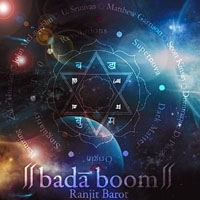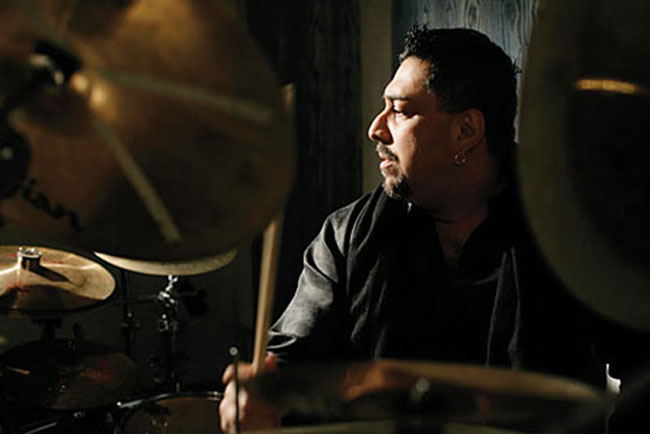Each week, World in Stereo examines classic and modern world music while striving for a greater appreciation of other cultures.
 Ranjit Barot: Bada Boom (Abstract Logix, 11/16/10)
Ranjit Barot: Bada Boom (Abstract Logix, 11/16/10)
Ranjit Barot: “Dark Matter”
[audio:https://alarm-magazine.com/wp-content/uploads/2010/12/05-Dark-Matter.mp3|titles=Ranjit Barot: “Dark Matter”]Dividing his formative years between England and India, Ranjit Barot falls at the crossroads of two cultures, with an aesthetic that draws heavily on Indian harmonic and rhythmic accents and R&B and jazz-rock fusions. In addition to having dozens of film scores credited to his name, Barot is also known as one of the most versatile drummers in the world, and most recently a part of the impressive roster of contemporary Indian musicians on John McLaughlin’s Floating Points.
But now Barot is finally taking a break from the film scripts and featured spots to make his debut as a leader. Bada Boom is Barot’s long-overdue solo debut, an album showcasing a musical approach crafted and shaped from a long career of session playing and film scoring. As a bilingual play on the Big Bang theory (“bada” is Hindi for “big”), Bada Boom is an epic in concept with a cast of players following suit, including John McLaughlin (Mahavishnu Orhestra) and legendary Indian tabla player and close family friend Zakir Hussain.
For the British-cum-Indian musician, the East-West dichotomy is something intrinsic. On Bada Boom, the dynamic leans toward an electrified jazz-fusion tradition with dense sets of harmonies that traverse classical ragas. Along with dozens of Carnatic and Hindustani Indian musicians, the international cast does a fantastic job in complementing Barot’s vision.
McLaughlin’s only appearance is on the album’s explosive opening track, “Singularity,” a tune with as many stages and phases as the Big Bang itself. The song shifts gears a number of times, from the rapidly expanding introductory riff, to the cooled down, groove-laden middle section laced with Punya Srinivas’ funky veena solos and Barot’s kannokal scatting. An epic McLaughlin guitar solo completes this Carnatic jazz-fusion universe by the track’s end.
Perhaps a testament to Barot’s cinematic background, the album moves along in episodic fashion. The result is a clear vision with thoughtful and meditative arrangements. From the first track onwards, listeners are propelled into musical cosmos where spacey arrangements and soaring vocals live alongside driving, fret-less bass lines and hard brass lines.
Sometimes the sonic landscape takes on a pastoral view, like on “T = O,” with its beautiful acoustic rendition of a Malayalam lullaby that sedates the listener before picking up with Barot’s soft but commanding drum kit. But then there are boisterous sets such as “Dark Matter,” a grand track featuring 14-year-old bass prodigy Mohini Dey and the vocals of Kirti Sagathia that subsumes the listener with its intricate layered ragas.
Though Barot’s musical career has spanned nearly three decades, his first solo album proves that it is still unfolding, if not only beginning. Although he is known for being a virtuosic drummer, what becomes apparent from Bada Boom is Barot’s knack for melodic structure. With a compositional process that elevates the players around him, Barot successfully blends the rhythmic and harmonic traditions of classical Indian music with the innovation of improvisation of rock-infused jazz.

